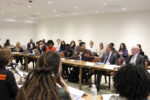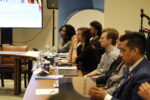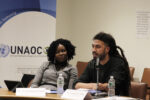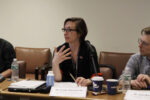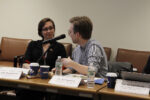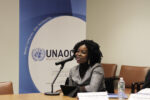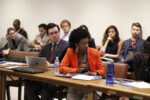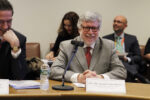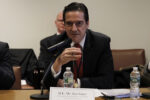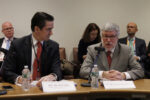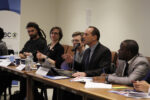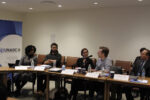1 – Remarks by H E Santos Maraver
2 – Remarks by H E Sauer
3 – Presentation by Abiodun Rufus Unegbu
4 – Presentation by Youness Ben Abbou
5 – Presentation by Michael McGill
6 – Panel Discussion
The United Nations Alliance of Civilizations (UNAOC) organized a side event during the 2019 ECOSOC Youth Forum, in partnership with the Permanent Mission of Spain to the United Nations, the Permanent Mission of Finland to the United Nations, the United Nations Population Fund (UNFPA)/Peacebuilding Support Office (PBSO) and Search for Common Ground. The event focused on a data-driven and evidence-based approach to investing in youth-led organizations for advancing the youth, peace and security agenda.
Opening remarks were delivered by H. E. Mr. Agustín Santos Maraver, the Permanent Representative of Spain to the United Nations and co-sponsor of UNAOC, and H. E. Mr. Kai Sauer, Permanent Representative of Finland to the United Nations. Both ambassadors spoke about the difficult period currently faced by the international community and encouraged young people to become global citizens in order to find solutions to these challenges. They also expressed the need for youth-focused disaggregated data to be used as evidence for refining interventions.
Ms. Abiodun Rufus Unegbu, Executive Director of the Leadership Initiative for Youth Empowerment, and Mr. Youness Ben-Abbou, International Project Coordinator of Chantiers Sociaux Marocains, then made presentations about their youth-led organizations. Both organizations received UNAOC’s Youth Solidarity Fund, which gives seed funding and technical support for projects that demonstrate innovative and effective approaches to intercultural or interfaith dialogue. Leadership Initiative for Youth Empowerment implemented a project to promote mutual understanding between Muslim and Christian communities following the insurgency in northern Nigeria, while Chantiers Sociaux Marocains used the support for a project that encouraged values of coexistence between local and migrant communities in five small cities in Morocco. The youth also shared lessons learned from their work, including the need for sustained funding beyond proof of concept, that safe spaces are required for activities and activism, and that young people should be supported in their creativity. A presentation was also made by Mr. Michael McGill, on results from an independent evaluation report he conducted on the Youth Solidarity Fund for the years 2016 and 2017. He stated that the Youth Solidarity Fund provided a pioneering and strategic service and the Government of Finland played a flagship role in supporting the initiative since its inception. Several lessons learned could be taken from the Youth Solidarity Fund and applied to similar donor funding programmes.
Ms. Cécile Mazzacurati, Head of Secretariat for the Progress Study on Youth, Peace and Security at UNFPA/PBSO, and Mr. Sölvi Karlsson, Program Manager – Children and Youth at Search for Common Ground, were then introduced as technical experts who could provide a global level view on an evidence-based approach of investing in youth-led organizations. Ms. Mazzacurati spoke about the Progress Study on Youth, Peace and Security that was mandated by Security Council Resolution 2250 (2015). She stated that looking at the data, just a minority of young people turn to violence. It was then necessary to shift the parameters for enquiry on the Progress Study, to ask why so many young people are peaceful and to look at the work that they are doing. Mr. Karlsson spoke about the mapping of youth-led organizations that was conducted by Search for Common Ground and the United Network of Young Peacebuilders, which provided input to the Progress Study. He said that such organizations have a level of access that cannot be matched even by international peacebuilding organizations, however, the mapping demonstrated that youth-led organizations are hampered by a lack of sustainable investment. He stated his belief that not investing in these initiatives are a missed opportunity for investing in peace.
A panel discussion took place between all participants that included an interactive dialogue with the audience. The panelists discussed the need for funding to be accessible in communities, which should be used to scale-up successful projects. Additionally, resource support and capacity-building need to occur together, that youth are empowered with the capacity to act with the funds they are given. It was acknowledged that youth-led organizations may not exist in perpetuity, and the focus should instead be on sustainable impact rather than sustainable structures. However, the importance of a framework for evaluation was also recognized, for the purpose of alignment and the creation of similar tools, such that an analysis of data could occur for youth-led peacebuilding organizations across different contexts and cultures.
The meeting closed with a call for interested stakeholders to convene through the Global Coalition on Youth, Peace and Security to discuss next steps on developing a framework for evaluation, and the evidence-based approach for investing in young people and youth-led peacebuilding organizations.
A presentation was also made about UNAOC’s youth programming. This included initiatives such as the Fellowship Programme, PLURAL+, PEACEapp, Young Peacebuilders and the Youth Solidarity Fund, as well as UNAOC’s involvement in youth policy through the Inter-Agency Network for Youth Development and the Global Coalition on Youth, Peace and Security. Reference was also made to the Youth Event at the 8th UNAOC Global Forum, where UNAOC’s young alumni were able to give their input on the implementation of Youth 2030: the UN Youth Strategy.

